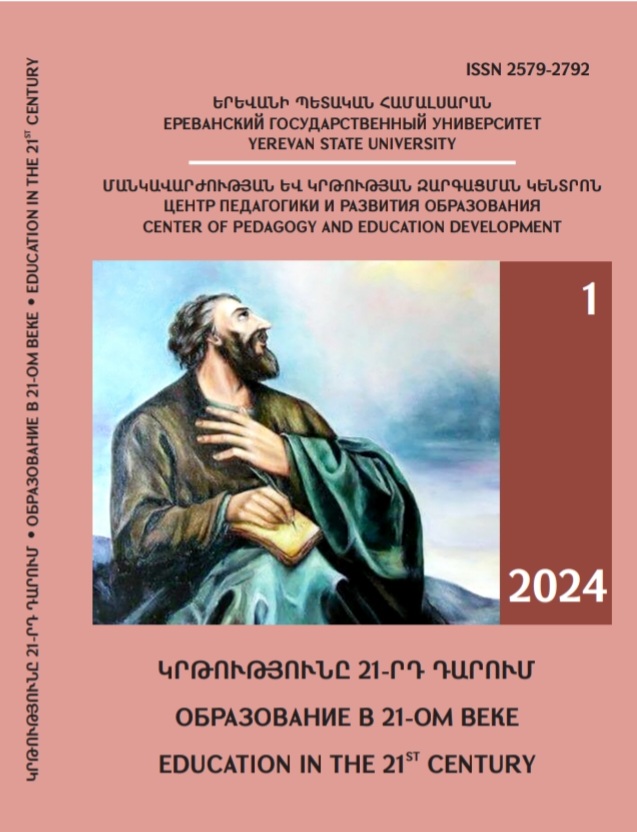INTEGRATING GENERATIVE AI IN STEM EDUCATION: A PATHWAY TO INCLUSIVE AND ENHANCED LEARNING
DOI:
https://doi.org/10.46991/ai.2024.1.93Keywords:
STEM, Artificial Intelligence (AI) in education, GhatGPT, inclusive education, personalized learning, higher education, school, public education, educational equity, educational technologiesAbstract
This article explores the integration of ChatGPT into STEM education as a means to address educational disparities and enhance learning experiences. Focused on making STEM education more inclusive and accessible, the research delves into ChatGPT's potential to democratize education by overcoming geographical and language barriers, thus providing quality educational resources to underprivileged communities. The study underscores ChatGPT's capabilities in facilitating personalized and interactive learning experiences, supporting complex subject comprehension, and aiding in practical problem-solving and laboratory work. The findings suggest that ChatGPT can significantly enhance the quality and effectiveness of STEM education, making it more engaging and tailored to diverse student needs. The article concludes with a call to action for policymakers, educators, and technology developers to invest in infrastructure and training, ensuring ChatGPT's benefits reach all learners globally, thereby contributing to a more equitable and enlightened future in education.
References
Abedi, M., Alshybani, I., Rubayat Bin Shahadat, M., Murillo, M. S., (2023). Beyond Traditional Teaching: The Potential of Large Language Models and Chatbots in Graduate Engineering Education. Qeios.
Cox, C., & Tzoc, E. (2023). ChatGPT: Implications for academic libraries. College & Research Libraries News, 84(3).
Fütterer, T., Fischer, C., Alekseeva, A. et al. (2023) ChatGPT in education: global reactions to AI innovations. Scientific Reports, 13.
Holmes, W., Bialik, M., & Fadel, C. (2019). Artificial intelligence in education: Promises and implications for teaching and learning. Center for Curriculum Redesign.
Liang, Y., Wang, F. L., Zou, D., & Xie, H. (2023). Exploring the potential of using ChatGPT in physics education. Smart Learning Environments, 10.
Ok, K. (2020). The impact of artificial intelligence on the educational achievement of students in science, technology, engineering, and mathematics (STEM) subjects: A systematic review. International Journal of Educational Technology in Higher Education, 17, 41.
Roll, I., & Wylie, R. (2016). Evolution and revolution in artificial intelligence in education. International Journal of Artificial Intelligence in Education, 26(2).
Samala, A.D., Zhai, X., Aoki, K., Bojic, L., Zikic, S. (2024). An In-Depth Review of ChatGPT’s Pros and Cons for Learning and Teaching in Education. International Journal of Interactive Mobile Technologies (iJIM), 18(2).
Trust, T., Whalen, J., & Mouza, C. (2023). Editorial: ChatGPT: Challenges, opportunities, and implications for teacher education. Contemporary Issues in Technology and Teacher Education, (CITE Journal) 23(1).
Xiao, C., Xu, S. X., Zhang, K., Wang, Y., & Xia, L. (2023). Evaluating Reading Comprehension Exercises Generated by LLMs: A Showcase of ChatGPT in Education Applications. Proceedings of the 18th Workshop on Innovative Use of NLP for Building Educational Applications (BEA 2023), Toronto, Canada: Association for Computational Linguistics.
Zhao, L., Wu, X., & Luo, H. (2022). Developing AI Literacy for Primary and Middle School Teachers in China: Based on a Structural Equation Modeling Analysis. Sustainability, 14(21).
Downloads
Published
How to Cite
Issue
Section
License
Copyright (c) 2024 Artur Mayilyan

This work is licensed under a Creative Commons Attribution-NonCommercial 4.0 International License.

